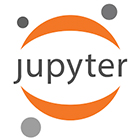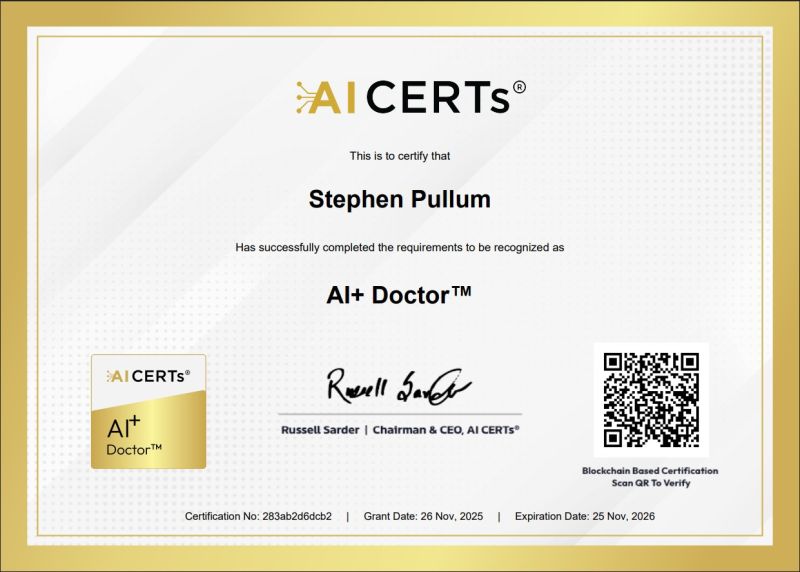AI+ Doctor™
AP 1101
Redefining Healthcare with AI-Driven Diagnosis- Clinical Intelligence Focus: Designed for medical professionals to integrate AI into patient care and diagnostics
- Data-Driven Decisions: Equips doctors with tools to interpret AI-generated insights for precise treatment planning
- Comprehensive Medical AI Knowledge: Covers AI applications from predictive analytics to medical imaging and virtual health
- Future-Ready Expertise: Empowers healthcare practitioners to lead AI-driven innovations in clinical practice
Why This Certification Matters
At a Glance: Course + Exam Overview
- Instructor-Led: 1 day (live or virtual)
- Self-Paced: 8 hours of content

Who Should Enroll?
Medical Practitioners: Enhance patient care with AI-driven tools for diagnostics, treatment planning, and clinical decision support.
Medical Students: Build future-ready skills by learning how AI is transforming modern medicine and clinical workflows.
Healthcare Administrators: Leverage AI to improve hospital operations, resource management, and patient service delivery.
Clinical Researchers: Apply AI for advanced data analysis, predictive modeling, and evidence-based medical research.
Health Tech Enthusiasts: Explore the synergy between AI and healthcare to innovate and contribute to next-gen medical solutions.
Industry Growth: Empowering Doctors with AI for Smarter Care
- The global AI in healthcare market size is projected to reach USD 505.59 billion by 2033, growing at a CAGR of 38.81% from 2025 to 2033. (Source: Grand View Research)
- AI is increasingly integral in diagnostics, enabling faster and more accurate detection of diseases.
- Healthcare institutions are prioritizing AI tools to automate workflows, reduce clinician workload, and improve operational efficiency.
- Personalized and precision medicine is expanding as AI tailors treatment plans based on patient-specific data and genetics.
- Demand is rising for physicians and clinical staff skilled in AI integration as hospitals drive digital transformation initiatives.

Skills You’ll Gain
- AI & Machine Learning in Healthcare
- Medical Imaging
- Predictive Analytics
- Clinical Decision Support
- NLP for EHRs
- AI-Powered Patient Monitoring
- Data-Driven Diagnosis
- Personalized Treatment
- Ethical & Regulatory Compliance
What You'll Learn
- 1.1 From Decision Support to Diagnostic Intelligence
- 1.2 What Makes AI in Medicine Unique?
- 1.3 Types of Machine Learning in Medicine
- 1.4 Common Algorithms and What They Do in Healthcare
- 1.5 Real-World Use Cases Across Medical Specialties
- 1.6 Debunking Myths About AI in Healthcare
- 1.7 Real Tools in Use by Clinicians Today
- 1.8 Hands-on: Medical Imaging Analysis using MediScan AI
- 2.1 Introduction to Neural Networks: Unlocking the Power of AI
- 2.2 Convolutional Neural Networks (CNNs) for Visual Data: Seeing with AI’s Eyes
- 2.3 Image Modalities in Medical AI: AI’s Multi-Modal Vision
- 2.4 Model Training Workflow: From Data Labeling to Deployment – The AI Lifecycle in Medicine
- 2.5 Human-AI Collaboration in Diagnosis: The Power of Augmented Intelligence
- 2.6 FDA-Approved AI Tools in Diagnostic Imaging: Trust and Validation
- 2.7 Hands-on Activity: Exploring AI-Powered Differential Diagnosis with Symptoma
- 3.1 Understanding Clinical Data Types – EHRs, Vitals, Lab Results
- 3.2 Structured vs. Unstructured Data in Medicine
- 3.3 Role of Dashboards and Visualization in Clinical Decisions
- 3.4 Pattern Recognition and Signal Detection in Patient Data
- 3.5 Identifying At-Risk Patients via Trends and AI Scores
- 3.6 Interactive Activity: AI Assistant for Clinical Note Insights
- 4.1 Predictive Models for Risk Stratification – Sepsis and Hospital Readmissions
- 4.2 Logistic Regression, Decision Trees, Ensemble Models
- 4.3 Real-Time Alerts – Early Warning Systems (MEWS, NEWS)
- 4.4 Sensitivity vs. Specificity – Metric Choice by Clinical Need
- 4.5 ICU and ER Use Cases for AI-Triggered Interventions
- 5.1 Foundations of NLP in Healthcare
- 5.2 Large Language Models (LLMs) in Medicine
- 5.3 Prompt Engineering in Clinical Contexts
- 5.4 Generative AI Use Cases – Summarization, Counselling Scripts, Translation
- 5.5 Ambient Intelligence: Next-Gen Clinical Documentation
- 5.6 Limitations & Risks of NLP and Generative AI in Medicine
- 5.7 Case Study: Transforming Clinical Documentation and Enhancing Patient Care with Nabla Copilot
- 6.1 Algorithmic Bias – Race, Gender, Socioeconomic Impact
- 6.2 Explainability and Transparency (SHAP and LIME)
- 6.3 Validating AI Across Populations
- 6.4 Regulatory Standards – HIPAA, GDPR, FDA/EMA Compliance
- 6.5 Drafting Ethical AI Use Policies
- 6.6 Case Study – Biased Pulse Oximetry Detection
- 7.1 Core Metrics: Understanding the Basics
- 7.2 Confusion Matrix & ROC Curve Interpretation
- 7.3 Metric Matching by Clinical Context
- 7.4 Interpreting AI Outputs: Enhancing Clinical Decision-Making
- 7.5 Critical Evaluation of Vendor Claims: Ensuring Reliability and Effectiveness
- 7.6 Red Flags in Commercial AI Tools: Recognizing and Mitigating Risks
- 7.7 Checklist: “10 Questions to Ask Before Buying AI Tools”
- 7.8 Hands-on
- 8.1 Identifying Department-Specific AI Use Cases
- 8.2 Mapping AI to Workflows (Pre-diagnosis, Treatment, Follow-up)
- 8.3 Pilot Planning: Timeline, Data, Feedback Cycles
- 8.4 Team Roles – Clinical Champion, AI Specialist, IT Admin
- 8.5 Monitoring AI Errors – Root Cause Analysis
- 8.6 Change Management in Clinical Teams
- 8.7 Example: ER Workflow with Triage AI Integration
- 8.8 Scaling AI Solutions Across the Healthcare System
- 8.9 Evaluating AI Impact and Performance Post-Deployment
Tools You'll Explore

Python

TensorFlow

Scikit-learn

Keras

Hugging Face Transformers

Jupyter Notebooks

Tableau

Matplotlib

SQL
Prerequisites
- Basic Medical Knowledge: Participants should have foundational knowledge of clinical practices, medical terminology and patient care processes.
- Familiarity with Healthcare Systems: A basic understanding of healthcare systems, including electronic health records (EHRs) and patient workflows will be beneficial.
- Interest in Technology Integration: A keen interest in exploring the intersection of AI and healthcare, along with a willingness to learn about AI applications in medical settings.
- Data Literacy: A basic understanding of data concepts, including data collection, analysis, and interpretation, is recommended for understanding AI models and metrics.
- Problem-Solving Mindset: Ability to approach challenges with a solutions-oriented mindset, especially when evaluating AI systems and adapting them to clinical settings.
Exam Details
Duration
90 minutes
Passing Score
70% (35/50)
Format
50 multiple-choice/multiple-response questions
Delivery Method
Online via proctored exam platform (flexible scheduling)
Exam Blueprint
- What is AI for Doctors? - 9%
- AI in Diagnostics & Imaging - 13%
- Introduction to Fundamental Data Analysis - 13%
- Predictive Analytics & Clinical Decision Support – Empowering Proactive Patient Care - 13%
- NLP and Generative AI in Clinical Use - 13%
- Ethical and Equitable AI Use - 13%
- Evaluating AI Tools in Practice - 13%
- Implementing AI in Clinical Settings - 13%
Choose the Format That Fits Your Schedule
What’s Included (One-Year Subscription + All Updates):
- High-Quality Videos, E-book (PDF & Audio), and Podcasts
- AI Mentor for Personalized Guidance
- Quizzes, Assessments, and Course Resources
- Online Proctored Exam with One Free Retake
- Comprehensive Exam Study Guide
Instructor-Led (Live Virtual/Classroom)
- 1 day of intensive training with live demos
- Real-time Q&A, peer collaboration, and hands-on
- Led by AI Certified Trainers and delivered through Authorized Training Partners
Self-Paced Online
- ~8 hours of on-demand video lessons, e-book, podcasts, and interactive hands-on
- Learn anywhere, anytime, with modular quizzes to track progress
Discover Your Ideal Role-Based Certifications and Programs!
Not sure which certifications to go for? Take our quick assessment to discover the perfect role-based certifications and programs tailored just for you.
Get CertifiedFrequently Asked Questions
Yes, this certification equips you with practical skills through real clinical scenarios and hands-on projects. You'll be ready to apply AI tools directly in healthcare settings.
This certification combines clinical context with hands-on AI training, focusing on real-world applications in diagnostics and patient care.
You’ll work on AI diagnostics, image analysis, EHR mining, and predictive models—simulating real clinical challenges for job-ready skills.
This course blends expert lessons, interactive modules, and hands-on projects with real clinical case studies. This ensures practical learning and strong skill retention.
It equips you with in-demand AI skills, real-world healthcare projects, and domain knowledge aligned with current industry job roles.




